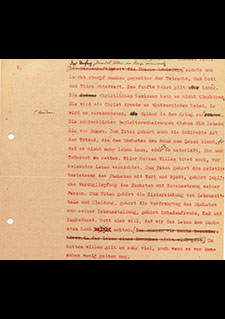On the Exegesis of the Fifth Commandment
In keeping with the central topic of discussion, the “Statement on the Exegesis of the Fifth Commandment”, a guide to the fifth commandment for pastors and elders, was the most important of the synod’s resolutions. Deliberations on it began at 9 p.m. Wilhelm Niesel, one of the participants, asserted that this text had driven in stakes for the sole possible path that the governing and the governed could tread if they did not want to go to ruin. (Niesel, Kirche, 275)
The synod intended its statement to contribute to sharpening consciences in order to counteract the dulling of sensibilities caused by the war’s events. It impressively sets out the breadth with which the concept of killing can be construed. Most notably, it also includes indirect killing, a clear allusion to Nazi tyranny’s brutal persecution and discrimination.
This excerpt from the text provides insight into the development of Point 8 of the statement. The adopted version in which the handwritten revisions were incorporated reads:
The scale killing takes on in war could easily dull us to the fact that God forbids killing. The fifth commandment always applies. A Christian conscience cannot disregard it. A Christian will never take pleasure in bloodshed. He will loathe driving nations to war. He is able to vividly imagine the horrible concomitants. Killing also includes the indirect kind of killing, taking one’s neighbor’s space to live so that he can no longer live long or failing to save him from mortal danger. Whoever destroys viable life is also killing contrary to God’s will. Killing includes injuring one’s neighbor’s spirit with words and derision, includes any manner of denigrating of one’s neighbor and disparaging of his person. Killing includes misappropriating food and clothing, includes driving one’s neighbor out of his livelihood, includes gloating, hatred and vengeance. God, however, wants us to esteem our neighbor’s life highly. It is worth much for God’s sake, even if it may be worth little before humans. (Hermle, Thierfelder, Herausgefordert, 665)
Source / title
- © Evangelisches Zentralarchiv in Berlin, Best. 50 Nr. 616

